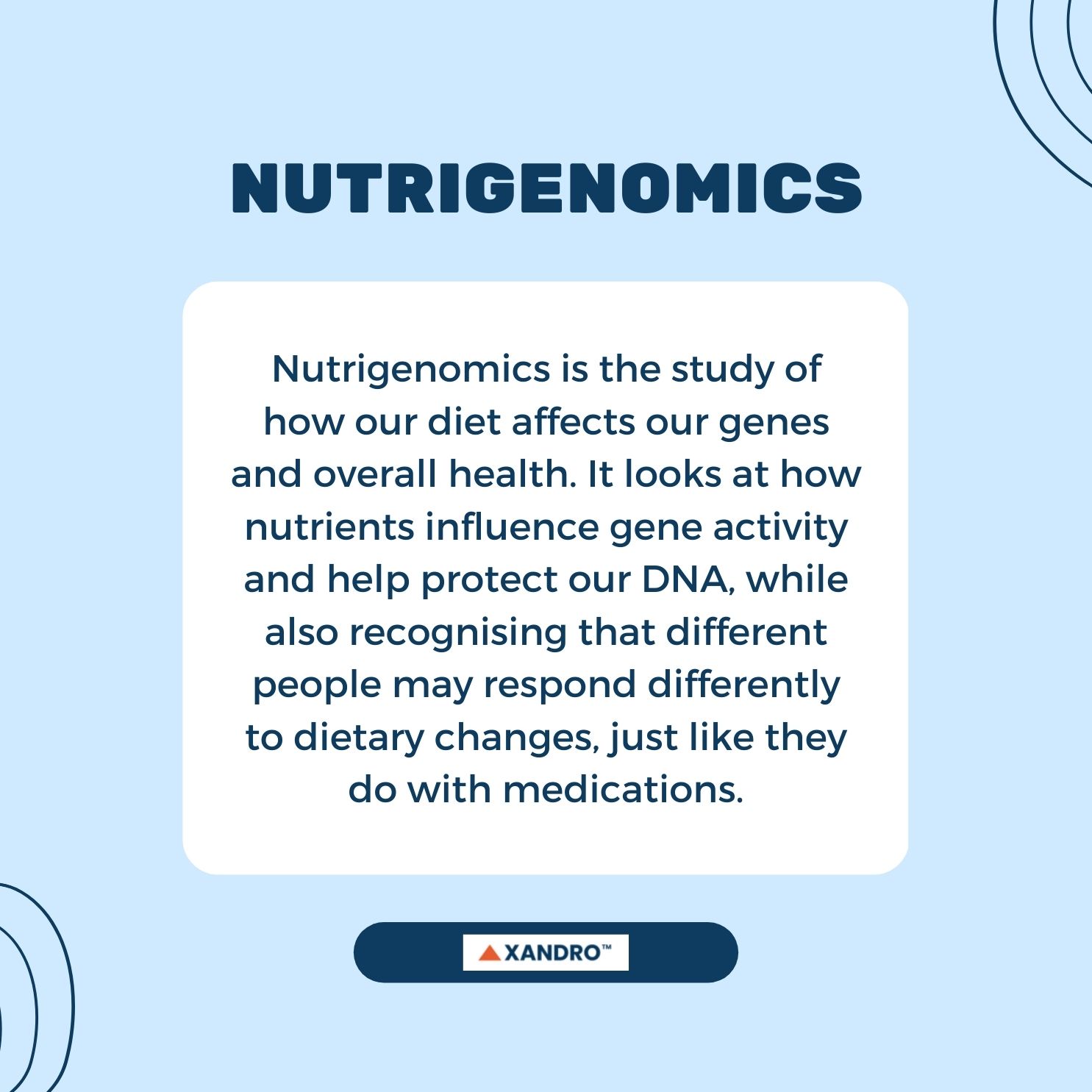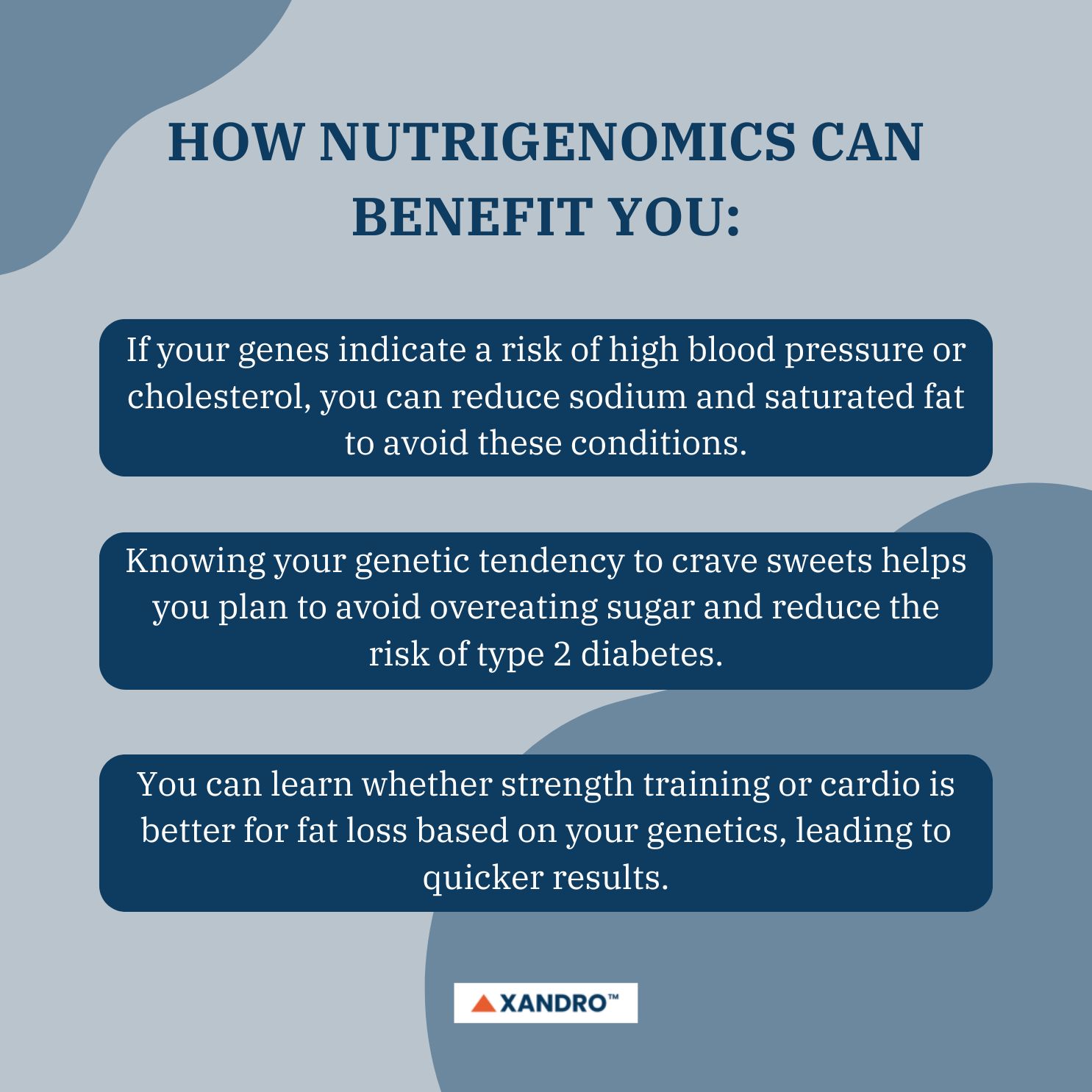What is Nutrigenomics? The Relationship Between Genes and Diet
9th Jul 2024
Discover Nutrigenomics: Personalised Nutrition To Transform Your Health
For those interested in living longer and healthier lives, nutrigenomics offers exciting insights into personalised nutrition, helping us understand how to tailor our diets to our unique genetic profiles.
But let’s take it back a step. What are nutrigenomics?
Jump there now:
- What is the Concept of Nutrigenomics?
- What are the Benefits of Nutrigenomic Testing?
- What is the Nutrigenomics DNA Diet?
- What is the Difference Between Nutrigenomics and Epigenetics?
Nutrigenomics explores how our diet interacts with our genes to influence our health and longevity. Unlike the old debate of nature versus nurture, today's scientists understand that health is shaped by both our genetic makeup and our lifestyle choices, like what we eat and how we live.
Nutrigenomics studies how nutrients affect gene expression and how diet can protect our DNA from damage. It looks at how what we eat impacts our genome (our complete set of DNA), proteome (all our proteins) and metabolome (all our metabolites). Just as different people respond differently to medications, nutrigenomics recognises that dietary interventions will benefit some people, while others may see no effect or even negative effects.

For example, nutrigenomics has identified nine key nutrients that impact DNA integrity. Increasing your intake of these vitamins and minerals can reduce DNA damage, promoting longevity
- Folate
- Vitamin B12
- Niacin
- Vitamin E
- Retinol
- Calcium
Excessive riboflavin, pantothenic acid and biotin, however, may increase DNA damage, similar to harmful environmental chemicals. This highlights how both nutrient deficiency and excess can significantly affect our DNA, showing just how important balanced nutrition is for maintaining health and longevity.
One of the main challenges in nutrigenomics is understanding how different nutrients interact with our complex biology. It’s hard to pinpoint the exact amounts of nutrients needed to keep our DNA stable, especially since genetic differences make people respond differently to diets. For example, the APOE gene has three types, each affecting heart disease risk and diet response differently.
Further Reading: List of Vitamins and Nutrients and the Foods to Get Them
Nutrigenomic testing can guide your daily choices to support longevity. For example, it can:
- Prevent High Blood Pressure or Cholesterol: If your genes indicate a risk, you can reduce sodium and saturated fat to avoid these conditions.
- Manage Sweet Cravings: Knowing your genetic tendency to crave sweets helps you plan to avoid overeating sugar and reduce the risk of type 2 diabetes.
- Understand Caffeine Sensitivity: If you get jitters from caffeine, your genes may explain why, encouraging you to cut it out.
- Help With Weight Loss: Discover if a high-protein diet suits your genetic makeup, helping you lose weight more effectively. A nutrigenomics example is variations in the FTO gene that influence metabolism, energy use and weight management. Knowing your FTO gene variants can help you understand how your body processes fat and protein and with a dietitian's guidance, you can create a personalised eating plan that suits your genetic makeup, promoting better health and longevity.
- Improve Fat Burning: Learn whether strength training or cardio is better for fat loss based on your genetics, leading to quicker results.
By understanding your genetic profile, you can make informed choices that support your long-term health and longevity.
Looking for nutrigenomic testing and specifically, nutrigenomics Singapore? Try out NutriReady™, a personalised nutrition DNA test to help you make informed decisions with your diet according to your DNA.

A nutrigenomic diet is a personalised eating plan based on your unique genetic makeup. Since everyone’s body is different, a one-size-fits-all diet doesn’t work for everyone, so researchers use DNA to create customised diets tailored to your genes.
How Does it Work?
- DNA Testing: You provide a DNA sample for analysis.
- Customized Diet Plan: Your genetic data is used to recommend a diet, considering your health and susceptibility to diseases.
- Diet Examples:
- Low-Carb Diet: High in protein, low in carbs, and includes non-starchy vegetables and healthy fats.
- Balanced Diet: A variety of foods from different groups, suitable for generally healthy individuals.
What Do Companies Consider?
- Allergies and Intolerances: These are factored into the diet recommendations.
- Genetic Variants: Companies check for genes linked to obesity, alcohol issues or food sensitivities.
- Supplementary Information: They may use questionnaires and blood tests to refine your diet plan.
Epigenetics involves making lifestyle, environmental and behavioural changes to influence how our genes are expressed, which can have positive or negative effects on our health.
Nutrigenomics, or nutritional epigenomics, focuses on how diet and supplements can affect gene expression in a similar way.
Why is This Important?
- Optimal Functioning: When genes are correctly programmed, our bodies work well. Errors or missing gene codes can lead to illness.
- Correcting Errors: Both epigenetics and nutrigenomics aim to fix these genetic errors. Genes need certain nutrients, or 'co-factors,' to function properly. Missing co-factors can prevent genes from working as they should.
- Identifying Needs: Genetic testing can identify which co-factors, such as betaine, choline, zinc, magnesium and vitamin B, are needed to support optimal gene function.
For those interested in longevity, understanding and applying both epigenetics and nutrigenomics can help maintain and improve health by ensuring genes function optimally.
Further Reading: Longevity Diet for Adults
End Note
Nutrigenomics is a growing and still developing field, with more research being made into how our diet affects our genes and how we can live longer by understanding our DNA.
There are a range of tests you can complete if you’re looking to get started. For example, you can speak with your doctor and get a blood test to see if you’re lacking any vitamins or minerals. Doing so will help you see if you have any deficiencies which, when fixed, will have you feeling healthier.
As we mentioned above, you can take the NutriReady™ DNA Test by NalaGenetics x Xandro Lab! This offers a lifetime of personalised nutrition insights by analysing your unique DNA to help you tailor your diet and supplements, identify food intolerances and determine your body's specific nutrient needs. Within 4–6 weeks, you'll receive a detailed report via email and the NalaGenetics app, including 127+ gene-nutrition insights and a customised meal plan.
Improve your health and longevity with a nutrition plan designed just for you!
